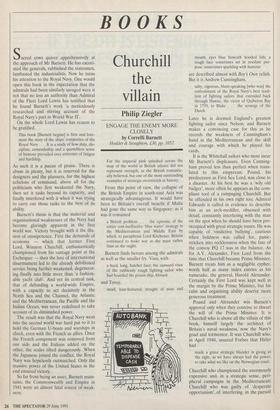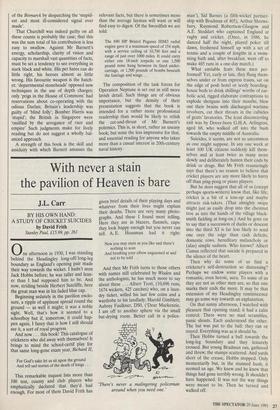BOOKS
Churchill the villain
Philip Ziegler
ENGAGE THE ENEMY MORE CLOSELY by Correlli Barnett Hodder & Stoughton, f30, pp. 1052 Sacred cows quiver apprehensively at the approach of Mr Barnett. He has excori- ated the generals, rubbished the statesmen, lambasted the industrialists. Now he turns his attention to the Royal Navy. One would open this book in the expectation that the admirals had been similarly savaged were it not that no less an authority than Admiral of the Fleet Lord Lewin has testified that he found Barnett's work 'a meticulously researched and stirring account of the Royal Navy's part in World War II'.
On the whole Lord Lewin has reason to be gratified.
This book [Barnett begins] is first and fore- most the story of the ships' companies of the Royal Navy ... It is a study of how duty, dis- cipline, comradeship and a quenchless sense of humour prevailed over extremes of fatigue and hardship.
As such it is a paean of praise. There is abuse in plenty, but it is reserved for the designers and the planners, for the highest echelons of command, above all for the politicians who first weakened the Navy, then set it tasks beyond its capacity, and finally interfered with it when it was trying to carry out those tasks to the best of its ability.
Barnett's thesis is that the material and organisational weaknesses of the Navy had become glaringly apparent in the first world war. Victory brought with it the illu- sion of omnipotence. First the demands of economy — which that former First Lord, Winston Churchill, enthusiastically championed from his vantage point at the Exchequer — then the lure of international disarmament led to the already debilitated service being further weakened, degenerat- ing finally into little more than 'a fashion- able yacht club'. And yet its central task, that of defending a world-wide Empire, with a capacity to act decisively in the North Sea and the Channel, the Atlantic and the Mediterranean, the Pacific and the Indian Ocean, was never redefined to take account of its diminished power.
The result was that the Royal Navy went into the second world war hard put to it to hold the German U-boats and warships in check, even with the French as allies. Once the French component was removed from one side and the Italians added on the other, the scales tilted dangerously. When the Japanese joined the conflict, the Royal Navy was hopelessly outmatched. Only the massive power of the United States in the end ensured victory.
So far from being an asset, Barnett main- tains, the Commonwealth and Empire in 1941 were an almost fatal source of weak- ness:
For the imperial pink splashed across the map of the world in British atlases did not represent strength, as the British romantic- ally believed, but one of the most outstanding examples of strategic overstretch in history.
From this point of view, the collapse of the British Empire in south-east Asia was strategically advantageous. It would have been to Britain's overall benefit if Malta had gone the same way as Singapore; as it was it remained
a British problem . . . the epitome of the entire cost-ineffective 'blue water' strategy in the Mediterranean and Middle East by which, to paraphrase Lord Kitchener, Britain continued to make war as she must rather than as she ought.
Barnett finds heroes among the admirals as well as the smaller fry. Vian, with
a hard, long, hatchet face; the outward visor of the ruthlessly tough fighting sailor who had boarded the prison ship Altmark
and Tovey,
small, lean-featured, straight of nose and mouth, eyes blue beneath hooded lids; a tough face sometimes set in resolute pur- pose, sometimes sparkling with humour
are described almost with Boy's Own relish. But it is Andrew Cunningham,
salty, vigorous, blunt-speaking [who was] thc embodiment of thc Royal Navy's best tradi- tion of fighting sailors that extended back through Hawke, the victor of Quiberon Bay in 1759, to Blake . . . the scourge of the Dutch.
Later he is deemed England's greatest fighting sailor since Nelson; and Barnett makes a convincing case for this as he records the weakness of Cunningham's hand in the Mediterranean and the skill and courage with which he played his cards.
It is the Whitehall sailors who most incur Mr Barnett's displeasure. Even Cunning- ham proved less than perfect when trans- lated to this empyrean; Pound, his predecessor as First Sea Lord, was close to a disaster. At his best he was a 'wily old badger', more often he appears as the com- pliant tool of a rampaging Churchill. But he offended in his own right too; Admiral Edwards is called in evidence to describe him as an arch-meddler, obsessed with detail, constantly interfering with the man on the spot when he should have been pre- occupied with great strategic issues. He was capable of 'vindictive bullying', cautious when boldness was called for, panic- stricken into recklessness when the fate of the convoy PQ 17 was in the balance. As for A.V. Alexander, First Lord from the time that Churchill became Prime Minister, Barnett treats him as a negligible cypher, worth half as many index entries as his namesake, the general, Harold Alexander. Certainly the First Lord was kept well in the margin by the Prime Minister, but his calm and organising ability deserve more generous treatment.
Pound and Alexander win Barnett's approval only when they contrive to thwart the will of the Prime Minister. It is Churchill who is above all the villain of this book, himself largely the architect of Britain's naval weakness, now the Navy's goad and tormentor. It was Churchill who, in April 1940, assured Forbes that Hitler had
made a grave strategic blunder in giving us the right, as we have always had the power, to take what we like on the Norwegian coast,
Churchill who championed the enormously expensive and, in a strategic sense, peri- pheral campaigns in the Mediterranean; Churchill who was guilty of 'desperate opportunism', of interfering in the pursuit
of the Bismarck by despatching the 'stupid- est and most ill-considered signal ever made'.
That Churchill was indeed guilty on all these counts is probably the case; that this was the sum total of his contribution is less easy to swallow. Against Mr Barnett's energy, scholarship, clarity of vision and capacity to marshall vast quantities of facts, must be set a tendency to see everything in stark black and white. His pet hates can do little right, his heroes almost as little wrong. His favourite weapon is the hatch- et: 'departmental stoneheads' opposed new techniques in the use of depth charges; only 'prigs in the House of Commons' had reservations about co-operating with the odious Darlan; Britain's leadership was guilty of 'blind folly'; Bomber Harris was 'stupid'; the British in Singapore were 'ossified by the arrogance of race and empire' Such judgments make for lively reading but do not suggest a wholly bal- anced approach.
A strength of this book is the skill and assiduity with which Barnett amasses the relevant facts, but there is sometimes more than the average layman will want or will find easy to digest. Of the Swordfish we are told:
The 690 HP Bristol Pegasus 111M3 radial engine gave it a maximum speed of 154 mph, with a service ceiling of 10,700 feet and a range of just over 1000 miles. It could carry either one 18-inch torpedo or one 1,500 pound mine hung between its fixed under- carriage, or 1,500 pounds of bombs beneath the fuselage and wings.. .
The composition of the task forces for Operation Neptune is set out in still more lavish detail. Such things are of obvious importance, but the density of their presentation suggests that the book is intended for a rather more professional readership than would be likely to relish the cut-and-thrust of Mr Barnett's polemics. This is, in short, rather an uneasy book; but none the less impressive for that, and essential reading for anyone who takes more than a casual interest in 20th-century naval history.



















































 Previous page
Previous page